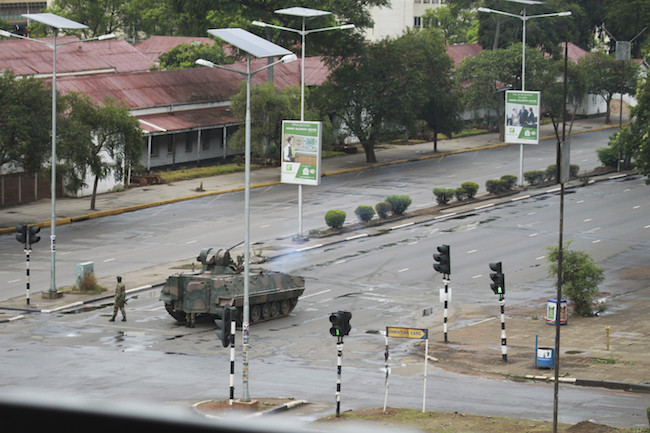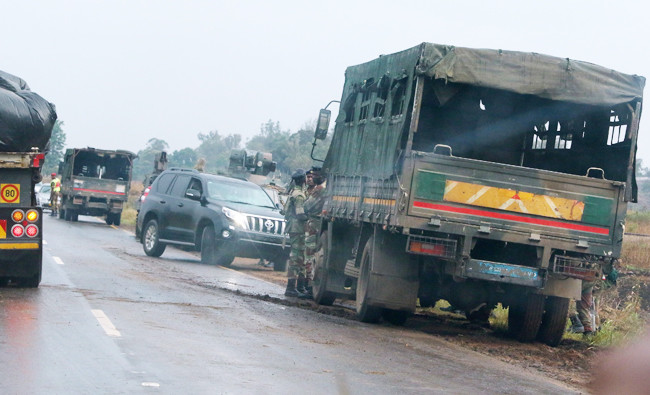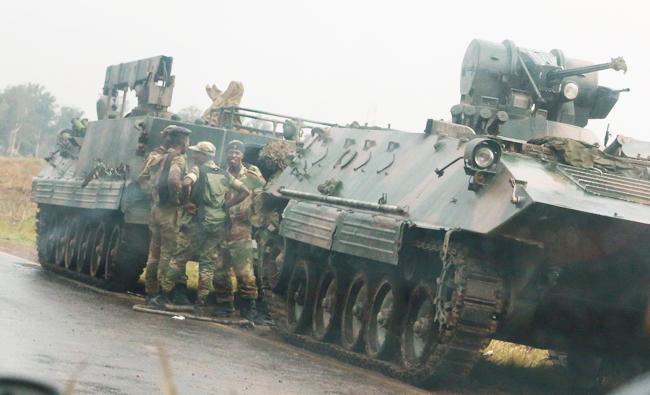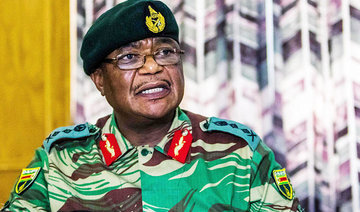HARARE, Zimbabwe: At least three explosions were heard in Zimbabwe’s capital early Wednesday and military vehicles were seen in the streets after the army commander threatened to “step in” to calm political tensions over 93-year-old President Robert Mugabe’s possible successor. The ruling party accused the commander of “treasonable conduct.”
An army source confirmed it is in charge of a paramilitary police support unit depot in Harare and has disarmed police officers there.
“They are now in charge of all armory, all gates and roads leading in or out of the camp. Arcturus Road (which leads to the camp) is closed and all Support Unit details with guns have been disarmed,” the source said.
The US Embassy closed to the public and encouraged citizens to shelter in place, citing “the ongoing political uncertainty through the night.” The British embassy issued a similar warning, citing “reports of unusual military activity.”
For the first time, this southern African nation is seeing an open rift between the military and Mugabe, the world’s oldest head of state who has ruled since independence from white minority rule in 1980. The military has been a key pillar of his power.
The Associated Press saw armed soldiers assaulting passers-by in the early morning hours in Harare, as well as soldiers loading ammunition near a group of four military vehicles. The explosions could be heard near the University of Zimbabwe campus. The developments came several hours after the AP saw three armored personnel carriers in a coHARARE, Zimbabwe: Zimbabwe’s army said Wednesday it has President Robert Mugabe and his wife in custody and is securing government offices and patrolling the capital’s streets following a night of unrest that included a military takeover of the state broadcaster.
The night’s action triggered speculation of a coup, but the military’s supporters praised it as a “bloodless correction.”
Armed soldiers in armored personnel carriers stationed themselves at key points in Harare, while Zimbabweans formed long lines at banks in order to draw the limited cash available, a routine chore in the country’s ongoing financial crisis. People looked at their phones to read about the army takeover and others went to work or to shops.
In an address to the nation after taking control of the Zimbabwe Broadcasting Corporation, an army spokesman said early Wednesday the military is targeting “criminals” around Mugabe, and sought to reassure the country that order will be restored.
Meanwhile South Africa on Wednesday urged Zimbabwe to resist any “unconstitutional changes.”
President Jacob Zuma “has expressed hope that developments in Zimbabwe would not lead to unconstitutional changes of government,” said a statement released in Pretoria.
Zuma appealed for “the country to resolve the political impasse amicably and has urged the Zimbabwean defense force to ensure... the maintenance of peace,” it added.
South Africa is an influential neighbor of Zimbabwe, with millions of Zimbabweans living in the country to seek work and flee Mugabe’s regime.
It was not clear where Mugabe, 93, and his wife were Wednesday but it seems they are in the custody of the military. “Their security is guaranteed,” the army spokesman said.
“We wish to make it abundantly clear that this is not a military takeover,” the army statement said. “We are only targeting criminals around (Mugabe) who are committing crimes that are causing social and economic suffering in the country in order to bring them to justice.”
The spokesman added “as soon as we have accomplished our mission, we expect that the situation will return to normalcy.” The army spokesman called on churches to pray for the nation. He urged other security forces to “cooperate for the good of our country,” warning that “any provocation will be met with an appropriate response.”
The statement called on troops to return to barracks immediately, with all leave canceled.
Overnight, at least three explosions were heard in the capital, Harare, and military vehicles were seen in the streets.
The military actions appear to put the army in control of the country. Army commander Constantino Chiwenga had threatened on Monday to “step in” to calm political tensions. Mugabe’s ruling ZANU-PF party responded by accusing the general of “treasonable conduct.” But now Chiwenga appears to be in control.
The army has been praised by the nation’s war veterans for carrying out “a bloodless correction of gross abuse of power.” The military will return Zimbabwe to “genuine democracy” and make the country a “modern model nation,” said Chris Mutsvangwa, chairman of the war veterans’ association, told The Associated Press in Johannesburg.
Mutsvangwa and the war veterans are staunch allies of Emmerson Mnangagwa, who was fired from his post of vice president by Mugabe last week. Mnangagwa fled Zimbabwe last week but said he would return to lead the country.
The US Embassy closed to the public Wednesday and encouraged citizens to shelter in place, citing “the ongoing political uncertainty through the night.” The British Embassy issued a similar warning, citing “reports of unusual military activity.”
For the first time, this southern African nation is seeing an open rift between the military and Mugabe, the world’s oldest head of state who has ruled since independence from white minority rule in 1980. The military has been a key pillar of his power.
Mugabe last week fired Vice President Emmerson Mnangagwa and accused him of plotting to take power, including through witchcraft. Mnangagwa, who enjoyed the military’s backing and once was seen as a potential president, fled the country and said he had been threatened. Over 100 senior officials allegedly supporting him have been listed for disciplinary measures by a faction associated with Mugabe’s wife, Grace.
The first lady now appears positioned to replace Mnangagwa as one of the country’s two vice presidents at a special conference of the ruling party in December, leading many in Zimbabwe to suspect that she could succeed her husband. Grace Mugabe is unpopular with some Zimbabweans because of lavish spending as many struggle, and four people accused of booing her at a recent rally were arrested.
The president reportedly attended a weekly Cabinet meeting Tuesday as the military vehicles were first sighted. It was not clear where his wife was.
On Monday, army commander Constantino Chiwenga issued an unprecedented statement saying purges against senior ruling ZANU-PF party officials, many of whom like Mnangagwa fought for liberation, should end “forthwith.”
“We must remind those behind the current treacherous shenanigans that when it comes to matters of protecting our revolution, the military will not hesitate to step in,” the army commander said. The state-run broadcaster did not report on his statement.
Showing a generational divide, the ruling party’s youth league, aligned with the 52-year-old first lady, on Tuesday criticized the army commander’s comments, saying youth were “ready to die for Mugabe.”
On Tuesday night the ruling party issued a statement accusing the army commander of “treasonable conduct,” saying his comments were “clearly calculated to disturb national peace and stability” and were “meant to incite insurrection.” It was not clear whether the commander still had his post.
State broadcaster Zimbabwe Broadcasting Corporation read out part of the ruling party statement late in the nightly news, which was led by a report on regional tourism.
The army spokesman was not immediately available for comment.
“Yes, given the past two weeks’ political events, it is tempting to speculate that there is a connection between the deployment of military personnel and the comments of the army chief of staff on an ‘intervention’ — but there are very real dangers of violence breaking out as a result of rampant and unfounded speculation,” African Defense Review analyst Conway Waddington wrote Tuesday evening, saying there appeared to be no other signs of an “organized coup” and that it could have been an act of intimidation instead.
Mugabe in the past has warned military commanders from interfering in succession politics. “Politics shall always lead the gun, and not the gun politics. Otherwise it will be a coup,” he told supporters in July.
Frustration has been growing in once-prosperous Zimbabwe as the economy collapses under Mugabe. The country was shaken last year by the biggest anti-government protests in a decade, and a once-loyal war veterans association turned on the president, calling him “dictatorial” and blaming him for the economic crisis.
“Mnangagwa was held out by many as the best hope within ZANU-PF for piloting an economic recovery,” analyst Piers Pigou with the International Crisis Group wrote Tuesday.
Now, “Mugabe will have to employ all his guile if he intends to ensure continued accommodation with the armed forces.”
Zimbabwe army has Mugabe and wife in custody, secures capital
Zimbabwe army has Mugabe and wife in custody, secures capital

China says US side initiated upcoming Geneva meeting on tariffs

China announced earlier that Vice Premier He Lifeng will visit Switzerland from May 9 to 12 during which He will also have a meeting with a US delegation led by Treasury Secretary Scott Bessent.
China’s position of opposing US tariffs has not changed and any dialogues must be based on equality, respect and mutual benefit, spokesperson Lin Jian told reporters.
India strikes Pakistan over tourist killings, Pakistan says Indian jets downed

- India fired missiles into Pakistani-controlled territory in several locations early Wednesday, killing at least 26 people including a child
- India says it struck terrorist sites in Pakistan; Pakistan says mosques, civilians hit, vows to respond
- Heavy cross-border shelling by both sides
MUZAFFARABAD/NEW DELHI: India attacked Pakistan and Pakistani Kashmir on Wednesday and Pakistan said it had shot down five Indian fighter jets in the worst fighting in more than two decades between the nuclear-armed enemies.
India said it struck nine Pakistani “terrorist infrastructure” sites, some of them linked to an attack by Islamist militants on Hindu tourists that killed 26 people in Indian Kashmir last month.
Islamabad said six Pakistani locations were targeted, and that none of them were militant camps. At least 26 civilians were killed and 46 injured, a Pakistan military spokesperson said.
Indian forces attacked the headquarters of Islamist militant groups Jaish-e-Mohammed and Lashkar-e-Taiba, an Indian defense source told Reuters.
“India has demonstrated considerable restraint in selection of targets and method of execution,” the Indian defense ministry said in a statement.
Pakistan said Indian missiles hit three sites and a military spokesperson told Reuters five Indian aircraft had been shot down, a claim not confirmed by India.
However, four local government sources in Indian Kashmir told Reuters that three fighter jets had crashed in separate areas of the Himalayan region during the night.
All three pilots had been hospitalized, the sources added. Indian defense ministry officials were not immediately available to confirm the report.
Images circulating on local media showed a large, damaged cylindrical chunk of silver-colored metal lying in a field at one of the crash sites. Reuters could not immediately verify the authenticity of the image.
Islamabad called the assault a “blatant act of war” and said it had informed the UN Security Council that Pakistan reserved the right to respond appropriately to Indian aggression.
“All of these engagements have been done as a defensive measure,” Pakistan military spokesperson Ahmed Sharif Chaudhry said. “Pakistan remains a very responsible state. However, we will take all the steps necessary for defending the honor, integrity and sovereignty of Pakistan, at all cost.”
The South Asian neighbors also exchanged intense shelling and heavy gunfire across much of their de facto border in the Himalayan region of Kashmir, police and witnesses told Reuters.
Hindu-majority India and Islamic Pakistan have fought two of their three wars since independence in 1947 over Muslim-majority Kashmir, which both sides claim in full and control in part.
’OPERATION SINDOOR’
Since a 2003 ceasefire, to which both countries recommitted in 2021, targeted strikes between the neighbors are extremely rare, especially Indian strikes on Pakistani areas outside Pakistani Kashmir.
But analysts said the risk of escalation is higher than in the recent past due to the severity of India’s attack, which New Delhi called “Operation Sindoor.” Sindoor is the Hindi language word for vermilion, a red powder that Hindu women put on the forehead or parting of their hair as a sign of marriage.
US President Donald Trump called the fighting “a shame” and added, “I hope it ends quickly.” The State Department said Secretary of State Marco Rubio spoke to the national security advisers of both nations, urging “both to keep lines of communication open and avoid escalation.”
UN Secretary-General Antonio Guterres called for maximum military restraint from both countries, a spokesperson said. China, which neighbors both India and Pakistan, also called for restraint.
The Pakistani army’s shelling across the frontier in Kashmir killed seven civilians and injured 35 in the Indian sector of the region, police there said.
Indian TV channels showed videos of explosions, fire, large plumes of smoke in the night sky and people fleeing in several places in Pakistan and Pakistani Kashmir. Reuters could not independently verify the footage.
In Muzaffarabad, the capital of Pakistani Kashmir, damage from the Indian strike was visible at sunrise. Security forces surrounded a small mosque in a hill-side residential neighborhood which had been hit, with its minaret collapsed.
All schools in Pakistani Kashmir, the national capital Islamabad, and much of Indian Kashmir and the populous Pakistani province of Punjab were ordered closed on Wednesday in the aftermath of the strikes.
Imran Shaheen, a district official in Pakistani Kashmir, said two mortars landed on a house in the town of Forward Kahuta, killing two men and injuring several women and children. In another village, a resident had been killed in firing, Shaheen said.
Pakistani Prime Minister Shehbaz Sharif said Islamabad was responding to the Indian attacks but did not provide details. Pakistan’s populous province of Punjab declared an emergency, its chief minister said, and hospitals and emergency services were on high alert.
A Pakistani military spokesperson told broadcaster Geo that two mosques were among the sites hit by India. The Pakistani defense minister told Geo that all the sites were civilian and not militant camps.
He said India’s claim of targeting “camps of terrorists is false.”
After India’s strikes, the Indian army said in a post on X on Wednesday: “Justice is served.”
STOCK FUTURES, AIRLINES IMPACTED
A spokesperson for the Indian Embassy in Washington told Reuters that evidence pointed “toward the clear involvement of Pakistan-based terrorists in this terror attack,” referring to the April tourist killings.
India said two of three suspects in that attack were Pakistani nationals but had not detailed its evidence. Pakistan denied that it had anything to do with the April killings.
News of the strikes impacted Indian stock futures mildly, with the GIFT NIFTY at 24,311, 0.3 percent below the NIFTY 50’s last close of 24,379.6 on Tuesday.
Several airlines including India’s largest airline, IndiGo , Air India and Qatar Airways canceled flights in areas of India and Pakistan due to closures of airports and airspace. Indian National Security Adviser Ajit Doval spoke to US Secretary of State Marco Rubio and other senior Indian officials briefed counterparts in Britain, Russia, Saudi Arabia and the United Arab Emirates, an Indian source told Reuters.
The Indian strike goes far beyond New Delhi’s response to previous attacks in Kashmir blamed on Pakistan. Those include India’s 2019 air strike on Pakistan after 40 Indian paramilitary police were killed in Kashmir and India’s retaliation for the deaths of 18 soldiers in 2016.
“Given the scale of the Indian strike, which was far greater than what we saw in 2019, we can expect a sizable Pakistani response,” said Michael Kugelman, a Washington-based South Asia analyst and writer for the Foreign Policy magazine.
“All eyes will be on India’s next move. We’ve had a strike and a counter-strike, and what comes next will be the strongest indication of just how serious a crisis this could become,” he said.
Trump, Ukraine propel EU and UK toward defense pact

- The EU and Britain look set to seal a defense pact at a landmark summit this month as worries about US President Donald Trump and the war in Ukraine spur them beyond the wrangles of Brexit
BRUSSELS: The EU and Britain look set to seal a defense pact at a landmark summit this month as worries about US President Donald Trump and the war in Ukraine spur them beyond the wrangles of Brexit.
Multiple EU diplomats and officials told AFP the signs are positive that a security agreement will be inked when British Prime Minister Keir Starmer meets EU chiefs in London on May 19.
The “security and defense partnership” is billed as an important first step in Starmer’s much-vaunted push to reset ties after the years of bad blood caused by the UK leaving the bloc.
The move is aimed at opening the door to closer cooperation as both the EU and Britain race to rearm in the face of the menace from Russia and fears Trump will no longer help protect Europe.
That should mean more regular security talks, Britain considering joining EU military missions and the potential for London to fully tap into a 150-billion-euro defense fund being set up by the bloc.
But the deal is expected to leave much of the detail to be filled in later — for instance requiring a further agreement on giving the UK and its defense industry unfettered access to the EU programs.
“It is a pre-condition for more serious stuff,” said one EU diplomat, talking like others on condition of anonymity to discuss internal discussions.
Diplomats said fears had subsided that a dispute over prolonging access to British waters for EU fishermen could derail talks as both sides are keen to improve relations amid the global turmoil unleashed by Trump.
“At this stage I’d say the odds are quite positive,” said a second EU diplomat. “But all the different files are linked, so lots can still happen between now and the 19th.”
The defense deal is expected to be signed alongside two other documents: one setting out a shared vision on global issues and another on the list of thorny subjects both sides hope to make progress on, including customs checks, energy links and a youth mobility scheme.
The drafts are set to be debated by EU ambassadors in Brussels on Wednesday and need to be signed off by all 27 before they can be forwarded to the British for final approval.
London and Brussels are treading carefully as closer cooperation with the EU remains a politically divisive issue for Starmer who faces a growing challenge from diehard euroskeptics Reform UK.
Reaching the security pact was long seen as the lowest hanging fruit for negotiators given that Britain already has intertwined defense ties with 23 EU countries in NATO.
Those bonds have only tightened as Trump has rattled Europe by pushing for a quick end to the war in Ukraine.
Britain has teamed up with France to spearhead plans for possibly deploying troops to Ukraine in the event of any deal.
In the latest sign of the closer relationship, British foreign minister David Lammy will meet his EU counterparts for talks in Warsaw on Wednesday.
London said Lammy would “make the case for a long-term UK-EU strategic partnership that will support economic growth, protect citizens, and support European collective security and defense.”
“We are working hand-in-hand with our European allies to build a safer, more secure, and more prosperous Europe,” Lammy said in a statement.
“Together, we will stand firm against aggression, defend our shared values, and deliver lasting peace. “
India’s leader Modi touted all was well in Kashmir. A massacre of tourists shattered that claim

- The attack outraged people in Kashmir and India, where it led to calls of swift action against Pakistan
SRINAGAR, India: Hundreds of Indian tourists, families and honeymooners, drawn by the breathtaking Himalayan beauty, were enjoying a picture-perfect meadow in Kashmir. They didn’t know gunmen in army fatigues were lurking in the woods.
When the attackers got their chance, they shot mostly Indian Hindu men, many of them at close-range, leaving behind bodies strewn across the Baisaran meadow and survivors screaming for help.
The gunmen quickly vanished into thick forests. By the time Indian authorities arrived, 26 people were dead and 17 others were wounded.
India has described the April 22 massacre as a terror attack and blamed Pakistan for backing it, an accusation denied by Islamabad. India swiftly announced diplomatic actions against its archrival Pakistan, which responded with its own tit-for-tat measures.
The assailants are still on the run, as calls in India for military action against Pakistan are growing.
World leaders have been scrambling to de-escalate the tensions between two nuclear-armed neighbors, which have historically relied on third countries for conflict management.
But the massacre has also touched a raw nerve.
Early on Wednesday, India fired missiles that struck at least three locations inside Pakistani-controlled territory, according to Pakistani security officials who spoke on condition of anonymity because they were not authorized to talk to the media. India said it was striking infrastructure used by militants.
India admits security lapse
Indian Prime Minister Narendra Modi’s administration has governed Kashmir with an iron fist in recent years, claiming militancy in the region was in check and a tourism influx was a sign of normalcy returning.
Those claims now lie shattered.
Security experts and former intelligence and senior military officers who have served in the region say Modi’s government — riding on a nationalistic fervor over Kashmir to please its supporters — missed warning signs.
The government acknowledged that in a rare admission.
Two days after the attack, Kiren Rijiju, India’s parliamentary affairs minister, said that a crucial all-party meeting discussed “where the lapses occurred.”
“We totally missed ... the intentions of our hostile neighbor,” said Avinash Mohananey, a former Indian intelligence officer who has operated in Kashmir and Pakistan.
The meadow, near the resort town of Pahalgam, can be reached by trekking or pony rides, and visitors cross at least three security camps and a police station to reach there. According to Indian media, there was no security presence for more than 1,000 tourists that day.
Pahalgam serves as a base for an annual Hindu pilgrimage that draws hundreds of thousands of people from across India. The area is ringed by thick woods that connect with forest ranges in the Jammu area, where Indian troops have faced attacks by rebels in recent years after fighting ebbed in the Kashmir Valley, the heart of an anti-India rebellion.
The massacre brought Modi’s administration almost back to where it started when a suicide car bombing in the region in 2019 prompted his government to strip Kashmir of its semi-autonomy and bring it under direct federal rule. Tensions have simmered ever since, but the region has also drawn millions of visitors amid a strange calm enforced by an intensified security crackdown.
“We probably started buying our own narrative that things were normal in Kashmir,” Mohananey said.
In the past, insurgents have carried out brazen attacks and targeted Hindu pilgrims, Indian Hindu as well as Muslim immigrant workers, and local Hindus and Sikhs. However, this time a large number of tourists were attacked, making it one of the worst massacres involving civilians in recent years.
The attack outraged people in Kashmir and India, where it led to calls of swift action against Pakistan.
Indian television news channels amplified these demands and panelists argued that India should invade Pakistan. Modi and his senior ministers vowed to hunt down the attackers and their backers.
Experts say much of the public pressure on the Indian government to act militarily against Pakistan falls within the pattern of long, simmering animosity between both countries.
“All the talk of military options against Pakistan mainly happens in echo chambers and feeds a nationalist narrative,” in India, New Delhi-based counterterrorism expert Ajai Sahni said.
“It doesn’t matter what will be done. We will be told it was done and was a success,” he said. “And it will be celebrated nonetheless.”
Modi’s optimism misplaced, experts say
Experts also say that the Modi government’s optimism was also largely misplaced and that its continuous boasting of rising tourism in the region was a fragile barometer of normalcy. Last year, Omar Abdullah, Kashmir’s top elected official, cautioned against such optimism.
“By this attack, Pakistan wants to convey that there is no normalcy in Kashmir and that tourism is no indicator for it. They want to internationalize the issue,” said D.S. Hooda, former military commander for northern India between 2014 to 2016.
Hooda said the “choice of targets and the manner in which the attack was carried out indicates that it was well-planned.”
“If there would have been a good security cover, maybe this incident would not have happened,” he said.
India sees Pakistan connection to the attack
Indian security experts believe the attack could be a retaliation for a passenger train hijacking in Pakistan in March by Baloch insurgents. Islamabad accused New Delhi of orchestrating the attack in which 25 people were killed. India denies it.
Mohananey said that Indian authorities should have taken the accusations seriously and beefed-up security in Kashmir, while arguing there was a striking similarity in both attacks since only men were targeted.
“It was unusual that women and children were spared” in both cases, Mohananey said.
Two senior police officers, who have years of counterinsurgency experience in Kashmir, said after the train attack in Pakistan that they were anticipating some kind of reaction in the region by militants.
The officers, who spoke on condition of anonymity because of the sensitivity of the matter, said that security officials perceived the threat of an imminent attack, and Modi’s inauguration of a strategic rail line in the region was canceled. A large-scale attack on tourists, however, wasn’t anticipated, because there was no such precedence, the officers said.
Hooda, who commanded what New Delhi called “surgical strikes” against militants in the Pakistan-controlled part of Kashmir in 2016, said that the attack has deepened thinking that it was time to tackle the Pakistani state, not just militants.
Such calculus could be a marked shift. In 2016 and 2019, India said that its army struck militant infrastructure inside Pakistan after two major militant attacks against its soldiers.
“After this attack,” Hooda said, India wants to stop Pakistan “from using terrorism as an instrument of state policy.”
“We need to tighten our security and plug lapses, but the fountainhead of terrorism needs to be tackled,” Hooda said. “The fountainhead is Pakistan.”
Trump says only 21 hostages held by Hamas in Gaza now believed to be alive

WASHINGTON: President Donald Trump said Tuesday that three hostages held by Hamas in Gaza have died, leaving only 21 believed to be still living.
“As of today, it’s 21, three have died,” Trump said of the hostages being held by Hamas, noting until recently it had been 24 people believed to be living. He did not elaborate on the identities of those now believed to be dead, nor how he had come to learn of their deaths. “There’s 21, plus a lot of dead bodies,” Trump said.
One American, Edan Alexander, had been among the 24 hostages believed to be alive, with the bodies of several other Americans also held by Hamas after its Oct. 7, 2023 assault on Israel.
The president’s comments came as Israel approved plans on Monday to seize the Gaza Strip and to stay in the Palestinian territory for an unspecified amount of time, in a bid to recover the hostages and try to fulfill its war aims of destroying Hamas. If implemented, the move would vastly expand Israel’s operations there and likely draw fierce international opposition.























